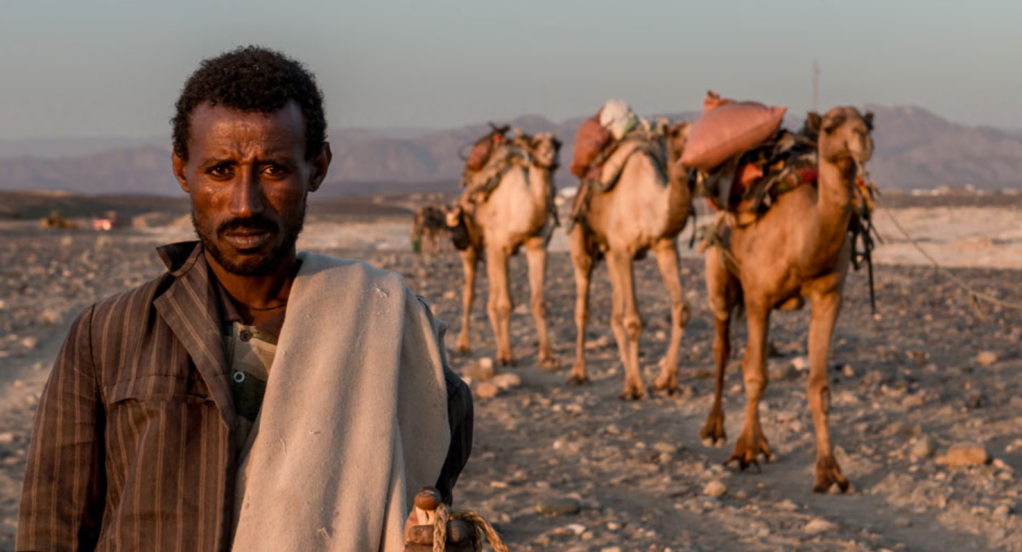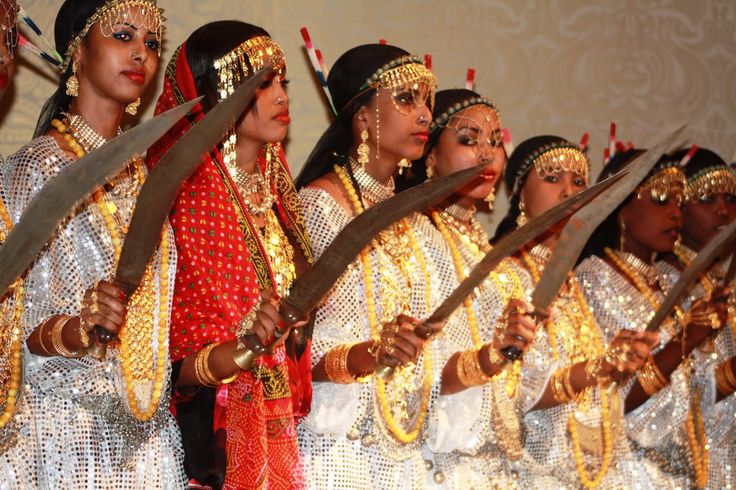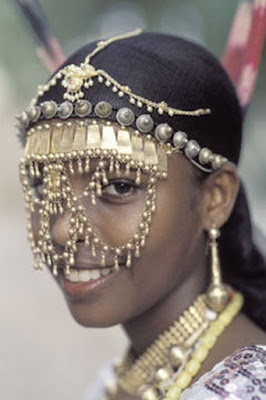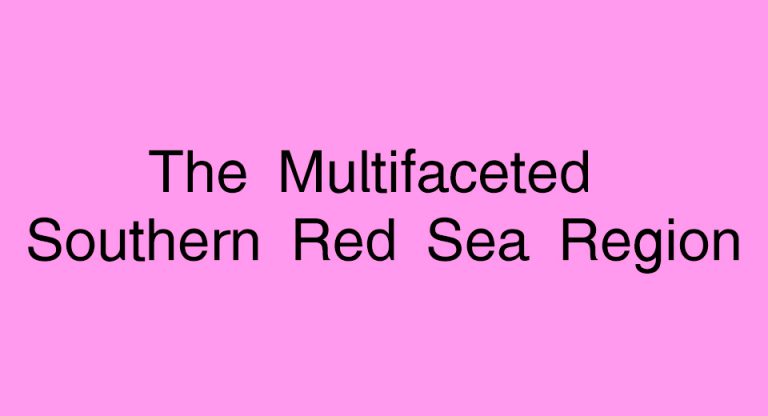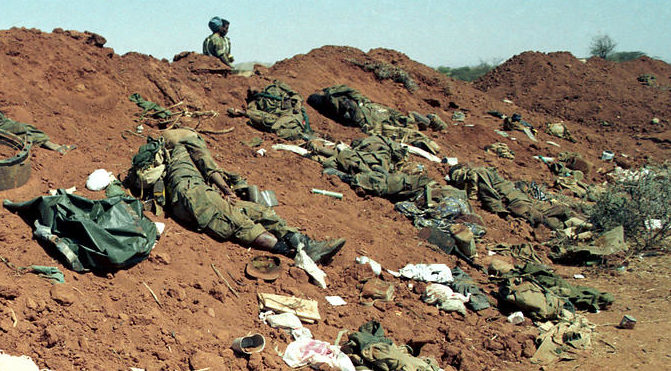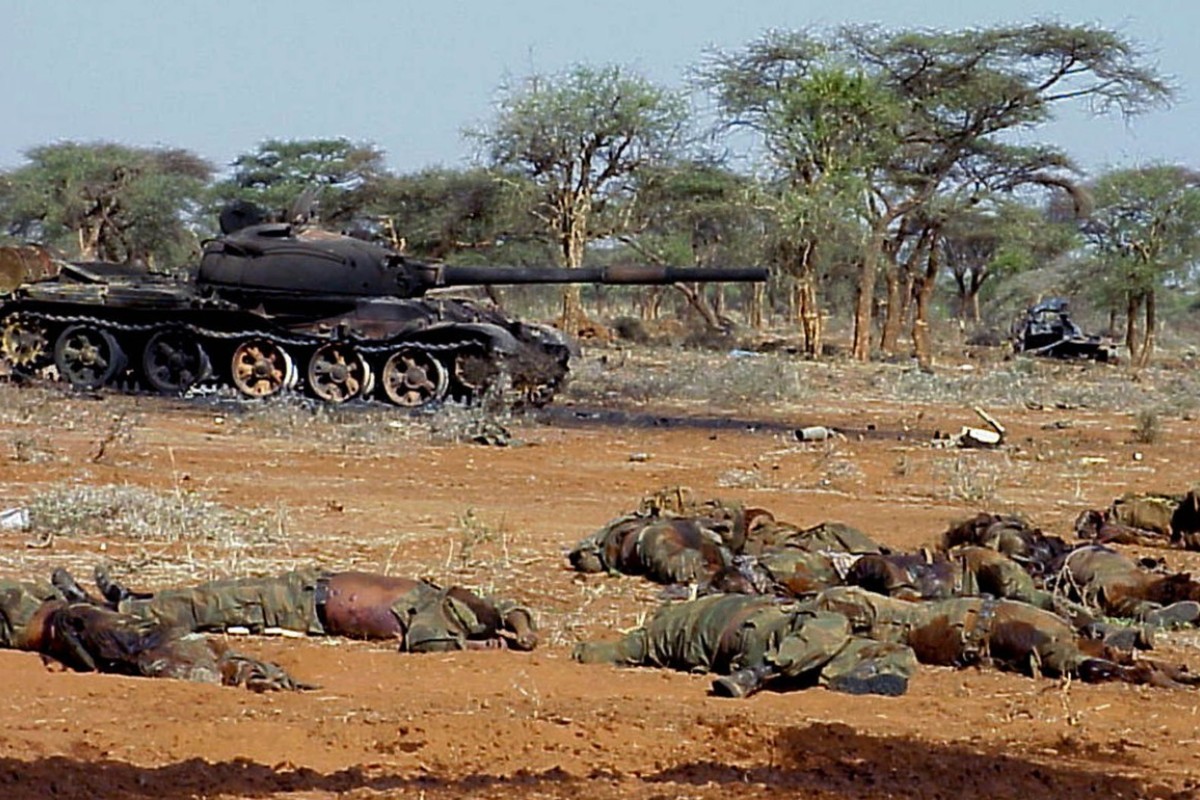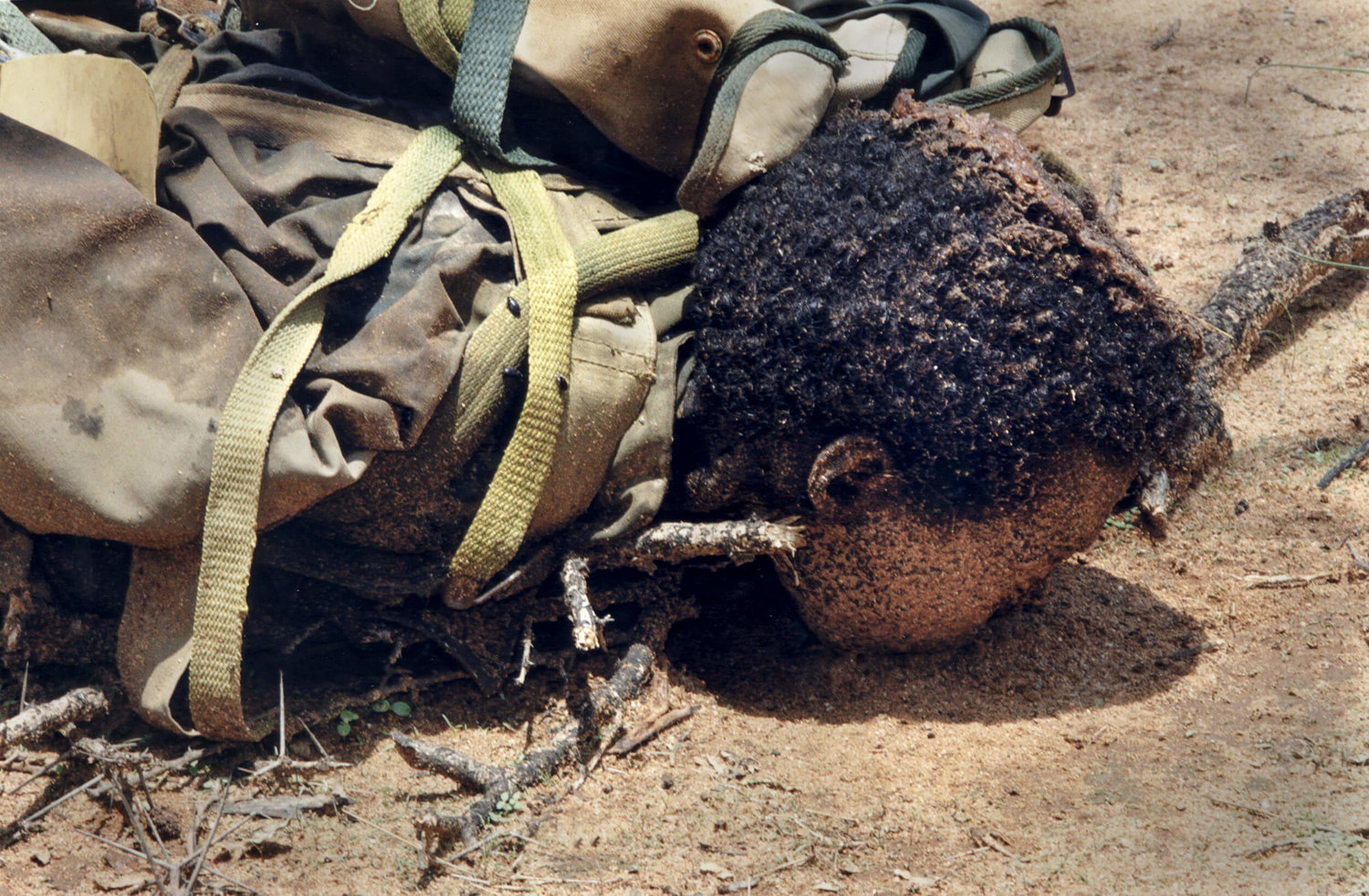 Point paper from Afar Liberation Front (ALF)
https://arhotabba.com/alf.html
Point paper from Afar Liberation Front (ALF)
https://arhotabba.com/alf.html
The Afar people live and co-exist with other oppressed nations and nationalities in Ethiopia. The Afar people are disadvantaged through numerous deliberate misguided political and economical policies imposed by successive Ethiopian governments, which kept our people in status of backwardness in all aspects of societal development. In the beginning of the 20th century, successive Ethiopian rulers kept the Afar people form advancing economically and politically.
In the early 1970s, during Emperor
Haile Selassie’s reign, the government of Ethiopia designed a program to confiscate the land form the Afar people along the Awash River under the pretext of development in which one hundred million US dollar was allocated to establish state farming for cash crops. In this program the Afars who live in the area were to be displaced to the most hostile areas and were kept out of the reach of the river, which has been the lifeline of the people. The program was also contrary to the traditional Afar people’s land ownership principle. The land in Afar is a communal property and not the property of the state. Even the traditional leader, the Sultan does not interfere and decided on the land issue. It is simply the common property of the tribes who occupy the area.
Under the Awash Valley Authority, a notoriously exclusive development was launched to displace the Afar people from the territories and the land they lived on for centuries. This situation ignited a total unrest. The Afar people appealed the case to the Ethiopian government but could not get any positive response to halt the massive displacement. At this point, the sultan tried and attempted to use his influence to mediate. His appeals fall on deaf ears. The “
confiscation of land” from the Afar people could not be stopped. The Afar people dissatisfaction began to increase with the Ethiopian government. The activities of Awash Valley Authority were later stopped under immense pressure of the local people of the upper Awash and the Sultan
Ali Mirha Hanfare.
The resistance of the Afar people against the Ethiopian government’s attempt to confiscate the communal land of the people, was the beginning of the of the political distrust, which resulted in the creation of the Afar Liberation Front (ALF). This is not to say, however, that Afar people opposed economic development of their territory. On the contrary, in the early 1960s a joint venture among the Ethiopian government, a British company namely
Michele Cotes, and the Afar people in the lower Awash valley, launched a successful cotton plantation. Unlike the Ethiopian government’s sponsored state farms, the joint venture assisted the local Afars in farming their own commercial farms in which visible middle classes Afars were emerging. Economically flourishing cities began to rise. Afars and other Ethiopians began to engage profitably in various commercial activities.
In 1974 however, a military junta overthrew the Emperor Haile Selasse and a socialist system was imposed on the Ethiopian People. Under the socialist system businesses were nationalized and land reform was declared and land ownership was transformed to the state. Thus, creating policies of “
land confiscation” which the Afar people and the sultan were vehemently opposed. The result was invasion of the Afar land by the military junta in June 3, 1975. The Military government demanded the unconditional surrender of the Sultan. The Afar people then gallantly resisted and rejected the policy of “
land confiscation” and started to defend themselves and their land. Thus, on June 3, 1975, ALF declared an armed struggle to defend the Afar people and their land..
The armed struggle of the Afar people, together with all the oppressed nationalities, thus continued against military junta for seventeen years until the defeat of the communist government of Ethiopia in 1991. During the struggle period the ALF was working on common platform to fight the common enemy with the Tigray People Liberation Front (TPLF) despite our differences on major issues such as TPLF preposterous claim the Afar’s land in Tigray province as their own and not as an integral part of Afar region. But when the TPLF changed their isolationist policy and decided to work with other oppressed nationalities of Ethiopia , we agreed to establish a Federal state with all Afar people in one region, and along other national states with own free broader and say in their internal affair to work closely under a lose Federal system. Thus, ALF continued to ally with TPLF and other liberation fronts to realize the long sought political settlement in which nations and nationalities of Ethiopia to be guaranteed under a constitution for the right for self-determination under a democratic Federal system. Even though this agreement with TPLF was reached in 1989, our close relationship however, dates back form 1976 when ALF was then effectively conducting the armed struggle and continued until the down fall of the military regime of Ethiopia in 1991.
When the London Conference was called in May 1991, the ALF participated as an ally with Ethiopian Peoples Revolutionary Democratic Front (EPRDF) to achieve a just political settlement and to create a democratic political institution which we all thought would pave the way for a democratic elections, establish an independent judiciary system and non-interference of the central government in the affairs of political organizations and elected local governments.
After the fall of the communist government of Ethiopia, in July 1991, the ALF participated in the Addis Ababa conference with all political organizations to draft a charter that guarantees equality, justice and constitutionally guaranteed rights for freedom of speech with an independent free press, respect for human rights, independent judiciary system, fair and free election, accept self-determination of nation and nationalities and establish a Federal system with non-interference of the central government in the affairs of the Federal states.
During the transition period, ALF was intensively engaged to establish democratic institutions, health and educational facilities and other economic and social institutions that could benefit the Afar people and thereby create a conducive environment to conduct the forthcoming regional election.
However, the minority TPLF government from the beginning interfered in the internal affairs of the Afar region to undermine the ALF, Afar people and their traditional leaders. TPLF imposed its undemocratic influence through intimidation, arbitrary arrest and outright killings. This inhuman activity of TPLF is known to the Afar people. The TPLF thus waged an undeclared war against the Afars in a feeble excuse of collecting taxes and recruit young Afar to liberate Tigray from the Ethiopian government. The ALF and the Afar people in all these areas fought against such deceitful activities of TPLF. The TPLF leaders mistakenly still believe that an economically strong Tigray can not be established without incorporating the fertile land and areas full of natural resources within Tigray region. To realize their hidden agenda, TPLF leaders have two objectives, namely to govern the Afar people by establishing a puppet political organization and to destroy ALF and the Afar people’s traditional institutions.
Since the end of May 1991 until August 1992, the TPLF political crimes against the Afar people are too. The following points can illustrate TPLF’s crimes against the Afar people and its political organization:
The traditional leader of the Afar people, Sultan Ali Mirah Hanfare and ALF called a conference for all the Afar people to explain about the new political environment and critical situation. The meeting was held in Ayssaita the capital city of Afar region. Foreign Embassy officials as well as international and national press attended the meeting. Despite success of the meeting, TPLF tried to sabotage the conference through intimidation, arresting locally elected elders and traditional tribe leaders from several regions of the Afar land. In this conference, the Afar people and the traditional tribe leaders reaffirmed Sultan Ali Mirha Hanfare as their legitimate leader of the Afar people. In additions, upon reviewing the political program of the ALF, the participant of the conference in the presence of the foreign designators, international and national press accepted the political program and gave the assurance to support ALF by praising the contribution and the struggle the organization had made for the Afar people.
The TPLF security forces and intelligence apparatus interfered from day one in the internal affairs of the Afar people.
Without unsubstantiated reasons, the TPLF soldiers started killing Afars in cities and in the rural areas. Thus, creating an environment of unrest among Afars and by causing a permanent clash between the TPLF security forces and Afar people. The entire killings were conducted to establish their influence in the region.
Under the pretext of the Transitional Government Representative, individuals dispatched to the Afar region solely Tigrians interfered in every aspect of the Afar peoples right. Rendered decision in all aspects of administrative process without consultation with ALF and the traditional tribe leaders and the Sultan. This situation had created unrest among the people. Indiscriminate killings, arrest and intimidation became daily norm. At the time the activities of the TPLF soldiers and Transitional Government Representative were reported by ALF to obtain a just solution to the inhuman suffering of our people. However, our appeals fall on deaf ears.
In the boarder region with Tigray now known as zone two and four, the ALF was bared from conducting political activities. The Afars in the area were prohibited by force not to go to other zone were they could get help from ALF. TPLF was attempting in these two zones not only to enhance the activities of their puppet organization, Afar Peoples Democratic Organization (APDO) but also to pave the way to incorporate these two zones of Afar region in Tigray to complete their long standing undeclared aspirations and process of confiscation of Afar land.
Before the demarcation of internal boarders among regions, TPLF attempted to separate the Awash City which is historically known to be located in the Afar region to create conflict between the Afars and the neighboring region. Despite TPLF’s attempt to create a long lasting conflict between the Afar people and ALF maintained its claim to the Awash City as an integral part of the Afar land. (Awash City is located 225 kilometer east of Addis Ababa.)
This is TPLF’s hidden agenda agenda to create conflicts among the neighboring nomadic nationality and Afars to further their military presence without attempting to find the solution to many problems. For example Sultan Ali Mirah Hanfare mediated the dispute that occurred around Bati city which resulted in peaceful co-existence of the Afars and Oromos.
TPLF forces in August 1991, in Datbahri city and the surrounding areas in the Afar region, zone one, conducted indiscriminate killings which resulted in 350 peoples death and 450 injured nomadic Afars.
Soon after in Elwaha area, in zone one, the TPLF soldiers attack before the sunrise, and killed 250 Afars and injured 300 without any reasons.
In Gawani city, on September 11, 1991, TPLF soldiers killed 600 people and injured about thousand people by closing the city and the main road between Addis Ababa and Assab. The soldiers, in the four days of mass killing, separated Afars youth and merchants from hotel rooms and houses and executed one hander of them in front the city dwellers. Among the executed were Afars from Eritrea and Djibouti who happened to be in the area to visit their relatives. During these four days rampant killings, ALF appealed to the central government to stop the indiscriminate killings; but the government did not attempt to take any actions.
An ALF representative who was at the time in Paris made an international appeal through
Agance France Presse to stop the killing and informed the international community that ALF will pull out from the transitional government if the killings could not stop. Only at this time, the TPLF led government ordered the killing to stop and established a committee to investigate the incident. As of today, the responsible military leaders who ordered and conducted the killing were not brought to justice.
All the main roads in Ethiopia were patrolled and protected by TPLF soldiers as agreed in the Transitional Charter. Accordingly, the road from Assab to Addis Ababa was patrolled also by the TPLF forces. As a repeated incident of robbery along the main road became frequent, the TPLF officials blamed ALF for failing to protect the road. ALF however conducted an extensive search to locate the perpetrators and found that the TPLF soldiers themselves were conducting the robbery. The soldiers who were caught handed to TPLF officials but neither an official investigation nor an action was taken to bring the soldiers to justices.
* Despite these horrendous crimes committed against our people, ALF continued to work in the Transitional Government and repeatedly showed its commitment to bring stability and peace in the region. In accordance with the Transitional Charter, a regional election was conducted in August 1992 in the Afar and Ogaden regions. The election in these two regions was delayed by TPLF to influence the outcome of the election and prepare their puppet organizations that actually did not have legitimacy with the people
* Among the election board officials there were hand picked top central committee members of the TPLF. ALF and other political organizations that were independent from the influence of TPLF knew the partiality of the TPLF in the elections. However, in the hope that TPLF would correct its misguided policy, ALF accepted the modality of the election and started to Campaign and continued its commitment for peace and stability. Here are some of the inconstancies and undemocratic activities of TPLF:
The Transitional Government participant, who included ALF, agreed to hold the election based on the imperial districts (Woreda). But, for example in the Afar region four districts which did not exist in the imperial period were added in the area adjacent to Tigray region to provide advantage to the TPLF’s puppet APDO. These added districts were became known to ALF and the people of Afar after the result of the election was made public.
In order to control the parliament and the Afar region, the TPLF purposely delayed the election in Telalek, Dawey, Hartuma, Shewarobi, Semu, in zone five. In zone three of Doulecha district, ALF own the election, but the result was with held to give a sizeable majority for APDO. However, due to miscalculation of the TPLF, ALF kept the majority in the regional parliament and there after elected
Habbib Ali Mirah Hanfare as the regional president.
When foreign election observers arrived to witness the “
fair election” in zone two and zone four, the observers upon arrival were told by TPLF officials that the election was conducted two weeks ago. According to their reasoning, the election in these zones was conducted before the official election date. In fact there was no election held in these zones. The winners of the elections in these zones were declared to be only APDO representatives.
The security forces of TPLF during the election period continuously intimidated the Afars from participating in the election unless they voted for APDO.
After ALF vehemently opposed to the outcome of the election in those added districts and other areas were the election were not held as discussed above, the election board agreed to establish a committee to investigate why the four districts which did not exist in the imperial period added. The board ruled until the investigation completed, the so-called elected APDO representatives in these districts not to participate in the parliament. However, APDO threatened not to participate in the parliament unless these officials were allowed to take part. The parliament with its newly elected representatives opened and held the first meeting on December 5, 1992. The APDO refused to take part in the new partiamnet unless their illegally so-called elected officials participate in the parliament. ADPO as a puppet of the TPLF, contacted directly the President of the country on December 8, 1992,
Meles Zenawi, the then president of Ethiopian under the Transitional Government which in turn ordered Mr.
Dawit Youhannis, Chairman of the Election Board to allow APDO members to take a seat in the parliament. ALF knowing that such interference was undemocratic and contrary to the election board decision, ALF, nevertheless, had to accept the unfair decision imposed on it, in the interest of working foe the Afar people, who put their trust and hope on it, to alleviate their problem which became worst than era of the communist regime.
Without the participation of the elected regional governments and consultation with ALF, the central government, led by TPLF, imposed administrative hindrances, which hampered the flaw of sound administration. It also hanged the administrative system them frequently, whereby a confusion was triggered to discredit the regional government and promote dissention against the elected officials of ALF to justify the take over of regional government by TPLF through its puppet organization, APDO.
* Since the establishment of the transitional government in Ethiopia and until 1993/1994-budget year, the Afar region did not receive any money to execute the necessary social and economic programs. In fact ALF was instrumental to carryout these programs. Ironically, TPLF continued its misinformation to discredit ALF and its elected officials by announcing a budget in millions of Birr through the mass media, which was never released to the regional government of the Afar region.
* In fact the 1993/194 budget was delayed four months and was not close to the announced figure. The TPLF does this to discredit the regional government and increase its influence through false promises. The 1994/1995 budget was held by the central government claiming misappropriation of funds. For the entire budget year, the government released only a portion of the budget for salaries. Thus hampering the economical and social developments, which could benefit the people. Government auditors in many occasions audited the regional government and could not substantiate the central government’s claim for misappropriation of public fund.
To further undermine the office of the elected regional government and impose hardship to the people of Afar and to halt independent economical and social developments, the TPLF led government in many occasions ordered the expulsion of potential investors from the region.
The period of 1995 regional and national election:
* Under the daily negative media waged against the elected officials and ALF, the Afar people in the majority of elections districts voted for ALF in the 1995 election. However, the TPLF controlled election board declared APDO as the winner of the election. There were many instances whereby APDO officials were declared to be the winners without counting the election ballots. The ALF reported these unfair election results to the Election Board with evidence of irregular election incidents. However, the Election Board nor the government could not investigated ALF’s legitimate claims or attempted to establish a committee to look in the irregularities of the elections in many parts of the Afar region. The people in several parts of the Afar region petitioned the Election Board indicating that the election was not conducted properly.
*Further to control the Afar people under the TPLF led government, to weaken the Afar unity and territorial integrity, a none Afar minority population that does not historically claim an area in the Afar region were create for Aragob tribes which were made to settle in zone three in Doulecha, especially designed district (Woerda) to divided the territorially [deleted] of land of Afar.
* In May 1994, conference of ALF, which was held in Ayssaita, Hanfare Ali Mirah, could not be reelected as a chairman of ALF due to differences with ALF members. The participant of the conference over warningly elected Omar Ali Mirah as the new Chairman of ALF. As a result, the ALF divided in two. One lead by Hanfare and the other by Omar.
* As the majority seats were declared for APDO, Hanfare was elected by the parliament as the new president of the regional government. Immediately after the election of Hanfare, disagreement started between APDO and the president. TPLF soldiers attached Hanfare’s and the Sultan Ali Mirah’s house respectively looting and killing the guards in Ayssaita and Dubti. This illustrates the unwillingness of political compromise and the disrespect to the traditional leader of the Afar people elected officials. This security threat to the traditional leader, which is accepted and supported by the people, was a major concern of the Afar people who seek guidance and advice of their Sultan. Sultan Ali Mirah who is committed to bring peace and stability to the region and the Horn of Africa was not taken a serious partner in the democratization process. This was a mistake.
* The TPLF’s ambitions to control the Afar region now appears to be realized when Hanfare was disposed in his absences outside of Ethiopia. TPLF appointed APDO Chairman
Ismail Alisero as the region’s president. Since then the parliament and the Afar region is fully controlled by the TPLF.
* In 1994 a population count was sponsored and conducted by the TPLF led government and the result was withheld until the election of 1995. The figure which was revealed after the election put the Afar population the number to be 4.5 millions. The government refutes the count claiming error during the population count, and ordered a new count in 1996. A new figure was then released without conducting the count whereby now the Afars reduced to 1.1 million. An accurate population count is imperative. The count is used to allocate budget, planning for education, health, and other social and economical programs. In additions, the number of Afar representatives at the central government’s parliament is decided on the population count. Therefore the inappropriate population count was designed to misrepresent the Afar and put them in disadvantage.
* In the beginning of 1996 and after the appointment of Mr. Ismail Alisero as the regional president, all ALF offices in the Afar region including the Addis Ababa office were closed and all official documents logistics of ALF were confiscated.
* In 1996, when regional government employees demonstrated against the delay for their salary, three hundred people were arrested in Ayssaita for four months without due process. A judge ordered the release of the prisoners on bail. The regional government of the TPLF imprisoned and dismissed the judge for his action.
* In the name of eliminating an opposition liberation front, namely, Afar Revolutionary Democratic Union Front (ARDUF) known as Ugguumo among Afars, in zone two and four, the TPLF wage indiscriminate killings of the civilian population by prohibiting any person from leaving the area until the front surrenders to TPLF authority.
* The TPLF despite its shameful act and disregard to the authority of Sultan Ali Mirah Hanfare, Prime Minster Meles Zenawi appealed to the Sultan and made him to come early from his foreign trip to help mediate with ARDUF. The Sultan as a committed peace ambassador, accepted Mr. Meles’s request to mediate. While he was made to wait to begin mediation, a massive military attack started against the innocent Afar civilians to cut the support of the local population from ARDUF. Helicopters and heavy artilleries were used to silence the dissatisfied population of the zones.
* It is to be remembered that ARDUF and TPLF were in constant clashes before TPLF sized power in Addis Ababa.
During this period TPLF confiscated sizeable Afar areas bordering Tigray region such as in Berahle district, Dedliso, Kudah, in Konneba district, Goua, Bonah, in Magale district, Arado, in Dallol district, Daga Giff (renamed Sebeba after confiscation be TPLF), and Aynedib. From 1996 until mid 1997, the Afar population was prohibited to come to the marketplace from exchanging goods and buy the necessities. It was imposed on the people of the area from meeting in the marketplaces
* The central government also prohibited government banks from lending capital for cash crop farming as wells as other economical developments while allowing and encouraging loans in other regions. In additions, harvested cotton for three years in row could not be market because the government could not open foreign market.
* There has been enormous lose of human and animal lives due to gross negligence by TPLF led government by not providing the necessary medicine required to fight epidemics on a timely manner. When the medicines come late, but the desperate use of several thousand people and cattle. In the Awash River basin, during the last nine years, over flooding of the river killed thousand Afars and livestock. The reason for this is the negligence of the government to maintain the dikes along the State Farms and settlement areas of the Afars.
* It will not be exaggerated to say that over five hundred thousand people lives were lost due famine, epidemics and lack of water, and through the indiscriminate killings conducted by TPLF soldiers. In additions, four million cattle were lost due epidemics, which could be controlled by proper vaccination.
* In another development, the TPLF knowingly, instigates and encourages a Somali tribe namely, Issa tribe to settle in Afar area were these tribes has no historical claim. In 1998, the TPLF led government made a secret agreement with its puppet APDO to give land and create a special zone for Issa tribe beginning from Djibouti broader, zone one through zone three, up to l Dire Dawa. When the agreement was made public the Afars protested the government action whose opposition to the government action, is still on going.
* The establishment of the Argoba district, the confiscation of Afar land in zone two and zone four, and the establishment of a special zone for Issa tribe which is in progress, clearly undermines the spirit of reconciliation and the struggle of the Afar people from oppression and subjugation by successive undemocratic Ethiopian governments.
* In its further desire to control the Afar region in totality, the TPLF has continued its 1997 program of consolidations process, using open intimidation, and the process of to mold all Afar democratic political organizations into one party undermines the pluralist democracy in the Afar region and is a clear intolerance for genuine opposition to the TPLF.
The ALF fought the communist government of Ethiopia along other nations and nationalities to bring a just and long lasting peace for our people and other nations and nationalities in Ethiopia. TPLF’s actions, since it took power in Addis Ababa does not comply neither to the initial Transitional Charter nor the constitution that was adapted by all including ALF. The question of land for Afars has immanence importance. Land is a communal property. The confiscation of the Afar land can not be compromised.
Despite the numerous intimidation, arbitrary arrest and killings of its members and the Afar people, the obvious irregularities in elections, the unfounded and unsubstantiated accusations against ALF, the ALF diligently, until the last resort, attempted to participate and struggle along other nations and nationalities to attain justices equality and peace for all in Ethiopia.
The international community must examine the undemocratic activities imposed not only to the Afars but also to all nations and nationalities of Ethiopia. The ALF and the Afar people believe a just peace can only be achieved through political compromise and respect for human rights. No political organizations should be allowed to be above the law and the constitution. The current political turmoil in the region is the result of TPLF’s undemocratic narrow minded activities.
We call on the international community to use all the necessary means at their disposal to pressure TPLF from leading the country into the brink of war, thus destabilizing Ethiopia in particular and the Horn of Africa in general. We also call all the Ethiopian political organizations to unite and continue pressure this undemocratic TPLF led government to come to its sense and stop the suffering of the people of Ethiopia.
arhotabba.com ©. Tous les droits réservés. Conditions d’utilisation et Politique de confidentialité